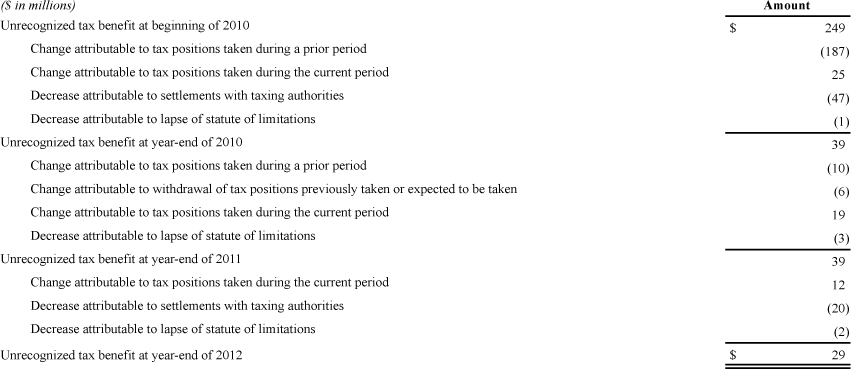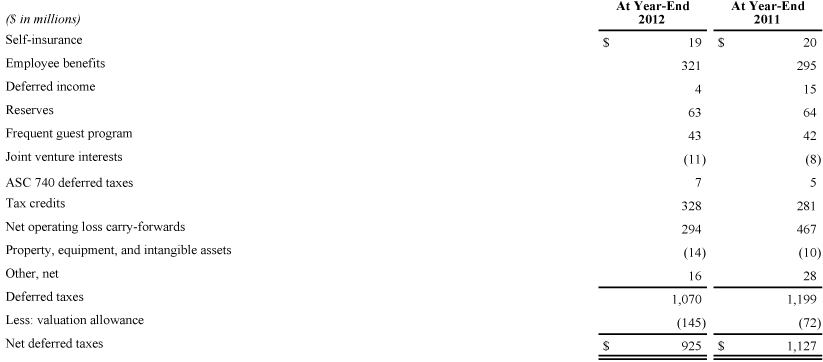Financial Information
2. INCOME TAXES
Our provision for income taxes for the last three fiscal years consists of:

Our current tax provision does not reflect the following benefits attributable to us for the vesting or exercise of employee share-based awards: $76 million in 2012, $55 million in 2011, and $51 million in 2010. The preceding table includes tax credits of $3 million in 2012, $4 million in 2011, and $2 million in 2010. We had a tax provision applicable to other comprehensive income of $5 million in 2012 and a tax benefit applicable to other comprehensive loss of $14 million in 2011. Taxes applicable to other comprehensive income were not material for 2010.
We have made no provision for U.S. income taxes or additional non-U.S. taxes on the cumulative unremitted earnings of non-U.S. subsidiaries ($603 million as of year-end 2012) because we consider these earnings to be indefinitely reinvested. These earnings could become subject to additional taxes if the non-U.S. subsidiaries dividend or loan those earnings to us or to a U.S. affiliate or if we sell our interests in the non-U.S. subsidiaries. We cannot practically estimate the amount of additional taxes that might be payable on the unremitted earnings.
We file income tax returns, including returns for our subsidiaries, in various jurisdictions around the world. We conduct business in countries that grant “holidays” from income taxes for 10 to 30 year periods. These holidays expire through 2034. Without these tax “holidays,” we would have incurred the following aggregate income taxes and related earnings per share impacts: less than $1 million (less than $0.01 per diluted share) in 2012; $1 million (less than $0.01 per diluted share) in 2011; and $7 million ($0.02 per diluted share) in 2010.
In 2011, we recorded an income tax expense of $34 million to write off certain deferred tax assets that we transferred to MVW in conjunction with the spin-off of our timeshare operations and timeshare development business. We impaired these assets because we considered it “more likely than not” that MVW will not be able to realize the value of those deferred tax assets. Please see Footnote No. 16, “Spin-off” for more information on the transaction.
In 2010, we reached a settlement with the Internal Revenue Service (“IRS”) Appeals Division resolving all issues that arose in the audit of tax years 2005 through 2008. This settlement resulted in an $85 million decrease in our tax expense for 2010 due to the release of tax liabilities we had previously established for the treatment of funds we received from non-U.S. subsidiaries. Our 2010 income tax expense also reflected a $12 million benefit we recorded primarily for revisions to estimates of prior years’ foreign income tax expenses. We filed an IRS refund claim relating to 2000 and 2001 software development costs. We settled this issue with the IRS in 2011 resulting in a refund of $8 million.
The IRS has examined our federal income tax returns, and we have settled all issues for tax years through 2009. We participated in the IRS Compliance Assurance Program (“CAP”), which accelerates the examination of key transactions with the goal of resolving any issues before the tax return is filed, for the 2010, 2011, and 2012 tax years. For the 2010 tax year all but one issue, which we are appealing, has been resolved. For the 2011 tax year, the audit is still ongoing, but we have received confirmation of our calculation of the value of the timeshare business that we spun off in 2011. Various income tax returns are also under examination by foreign, state and local taxing authorities.
We had total unrecognized tax benefits of $29 million at year-end 2012, $39 million at year-end 2011, and $39 million at year-end 2010. These unrecognized tax benefits reflect the following year-over-year changes: (1) a $10 million decrease in 2012, primarily reflecting the changes attributable to settlements with taxing authorities and positions taken during the current year; (2) no net change in 2011, although 2011 included increases such as positions for our timeshare spin-off, and decreases such as the closing of the 2005-2008 IRS audits, the re-measurement of existing positions, and the lapse of statutes of limitations; and (3) a $210 million decrease in 2010, primarily reflecting the settlement with IRS Appeals of the 2005-2008 tax years.
As a large taxpayer, the IRS and other taxing authorities continually audit us. We anticipate resolving an international issue related to financing activity during the next 12 months for which we have an unrecognized tax balance of $5 million. Although the resolution of this issue could have a significant impact on our unrecognized tax balance, we do not anticipate that it will have a material impact on our Financial Statements.
On January 2, 2013, the American Taxpayer Relief Act of 2012 (the “Act”) was signed into law. Some of the provisions contained in the Act are retroactive, and we anticipate recognizing the impact of the legislation in the first quarter of 2013. We do not anticipate the Act will have a material impact on our Financial Statements.
Our unrecognized tax benefit balances included $13 million at year-end 2012, $24 million at year-end 2011, and $26 million at year-end 2010 of tax positions that, if recognized, would impact our effective tax rate.
The following table reconciles our unrecognized tax benefit balance for each year from the beginning of 2010 to the end of 2012:

Under our accounting policies, we recognize accrued interest and penalties for our unrecognized tax benefits as a component of tax expense. Related interest expense totaled less than $1 million in 2012, $1 million in 2011, and $2 million in 2010. Accrued interest expense totaled $3 million in 2012, $3 million in 2011, and $4 million in 2010.
Deferred Income Taxes
Deferred income tax balances reflect the effects of temporary differences between the carrying amounts of assets and liabilities and their tax bases, as well as from net operating loss and tax credit carry-forwards. We state those balances at the enacted tax rates we expect will be in effect when we actually pay or recover the taxes. Deferred income tax assets represent amounts available to reduce income taxes we will pay on taxable income in future years. We evaluate our ability to realize these future tax deductions and credits by assessing whether we expect to have sufficient future taxable income from all sources, including reversal of taxable temporary differences, forecasted operating earnings, and available tax planning strategies to utilize these future deductions and credits. We establish a valuation allowance when we no longer consider it more likely than not that a deferred tax asset will be realized.
We had the following total deferred tax assets and liabilities at year-end 2012 and year-end 2011:

The following table details the composition of our net deferred tax balances at year-end 2012 and 2011:

The following table shows the tax effect of each type of temporary difference and carry-forward that gave rise to a significant portion of our deferred tax assets and liabilities as of year-end 2012 and year-end 2011:

At year-end 2012, we had approximately $92 million of tax credits that expire through 2032 and $236 million of tax credits that do not expire. We recorded $50 million of net operating loss benefits in 2012 and $332 million in 2011. At year-end 2012, we had approximately $1.7 billion of net operating losses, of which $1.0 billion expire through 2032.
Reconciliation of U.S. Federal Statutory Income Tax Rate to Actual Income Tax Rate
The following table reconciles the U.S. statutory tax rate to our effective income tax rate for the last three fiscal years:

(1) Primarily for the 2010 treatment of funds received from certain non-U.S. subsidiaries, as discussed earlier in this footnote.
(2) Primarily for the 2011 additional impairment of certain deferred tax assets transferred to MVW, as discussed earlier in this footnote.
Cash received for income tax refunds, net of payments, was $17 million in 2012. Cash paid for income taxes, net of refunds, was $45 million in 2011 and $68 million in 2010.
